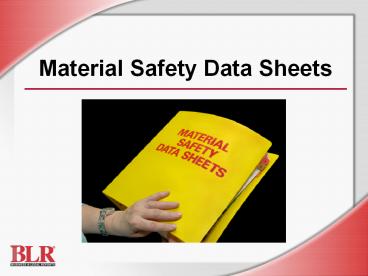Material Safety Data Sheets - PowerPoint PPT Presentation
Title: Material Safety Data Sheets
1
Material Safety Data Sheets
2
Session Objectives
- You will be able to
- Recognize the importance of the MSDS
- Access an MSDS
- Locate essential safety and health information
- Interpret the information accurately
3
What You Need to Know
- Purpose of the MSDS
- How to access an MSDS
- How to find and interpret essential safety and
health information - How to use MSDS information to protect against
chemical hazards
4
Right to Know
- Hazard Communication Standard
- Right-to-know information
- MSDS and your right to know
5
MSDS and Hazard Communication
- Chemical manufacturers
- Employers
- Employees
6
MSDSThe Foundation of Chemical Safety
- The MSDS tells you
- What chemicals are contained in a product
- What the hazards are
- What precautions you need to take
- What to do in the event of a spill or exposure
7
Accessing an MSDS
- Chemical list as index to MSDS system
- Binder system
- Computer-generated MSDSs
8
MSDS Formats
- Different formats permitted
- Section numbers and titles may vary
- Same basic information provided regardless of
format
9
Importance of the MSDS
- Do you understand the information that has been
presented so far?
10
Product Information
- Manufacturer name, address, and phone number
- Emergency phone number
- Name of chemical
- Date of MSDS
11
Chemical Ingredients
- Hazardous chemical names
- Percentage of chemical in product
- Nonhazardous ingredients
- Trade secrets
12
Exposure Limits
- PEL (Permissible Exposure Limit)
- STEL (Short-Term Exposure Limit)
- TLV (Threshold Limit Value)
13
Physical Properties
- Boiling point and melting point
- Vapor pressure and evaporation rate
- Vapor density
- Solubility in water and specific gravity
- How chemical looks and smells under normal
conditions
14
Health Hazards
- Routes of entry
- Health effects and symptoms of exposure
- Effect on existing medical conditions
- Target organs
15
Fire and Explosion Data
- Flashpoint
- Flammability limits
- Hazardous combustion products
16
Fire Data (cont.)
- Extinguishing measures
- Firefighting equipment and methods
17
Reactivity Information
- Chemical stability
- Conditions to avoid
- Incompatibility with other substances
18
Reactivity Information (cont.)
- Hazardous decomposition products
- Hazardous polymerization
19
Safe Handling Precautions
- Storage recommendations
- Dispensing requirements
20
Safe Handling Precautions (cont.)
- Handling instructions
- Warnings
- Decontaminant or antidote
- Disposal requirements
21
Exposure Control
- Engineering controls
- PPE
- Hygiene
22
Spills and Leaks
- Evacuation and isolation of area
- Evaluation by trained responders
- Containment
- Cleanup
23
First Aid
- Eyes
- Skin
- Inhalation
24
First Aid (cont.)
- Ingestion
- Notes to physician
25
Basic MSDS Information
- Do you understand all the information that was
presented in the previous slides?
26
Additional Information
- Ecological
- Toxicological
- Transportation
- Regulatory
27
Label Information
- Health Blue
- Flammability Red
- Instability or Reactivity Yellow
- Other hazards or special handling White
- Scale 0 (no hazard) to 4 (extreme hazard)
28
Key Points to Remember
- The MSDS is the foundation of chemical safety
- MSDSs must be accessible at all times
- Always read the MSDS before working with a
chemical - Ask a supervisor if you still have questions
about hazards or precautions































